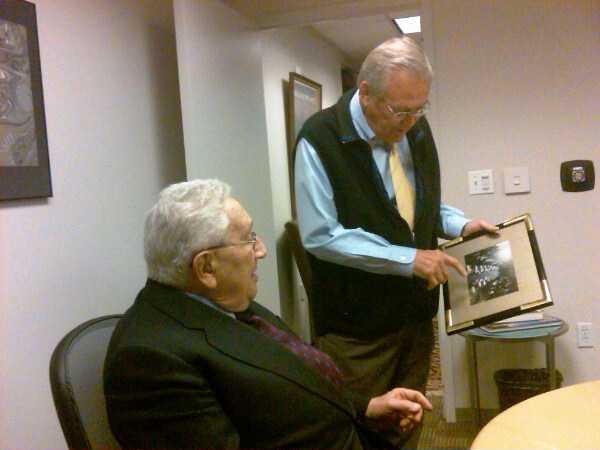The future of U.S.-China relations as told by Henry Kissinger.

â??I brought this picture out for you, Henry,â? Donald Rumsfeld says to Henry Kissinger, proffering a framed black and white photo of a line of men sitting across from each other at a diplomatic gathering. â??It was right after Vladivostok.â?
â??When you went to China with me?â? Kissinger asks, perking up.
â??I took you into China and introduced you to Zhou Enlai,â? Rumsfeld says, with a smile and a slight chuckle. â??No, no, thatâ??s not how it worked.â?
â??No, but he was still alive, actually,â? Kissinger says.
â??Yes, you met with him,â? Rumsfeld says. He has one hand in the pocket of his trademark fleece vest. â??But hereâ??s Deng Xiaoping, your friends Habib, and Winston Lord, and George Herbert Walker Bush, and Philâ?¦â?
â??I remember that meeting,â? Kissinger says, peering through his spectacles at the shadowy photo. â??With Deng.â?
The two veterans of a thousand policy arguments and diplomatic quarrels are quiet for a moment, looking into the past, at two lines of men divided by ideas and the sea, individuals who would shape the world for half a century and more.
Rumsfeld was hosting Kissinger - who inscribed a book to the two-time Defense Secretary as an â??occasional adversary and permanent friendâ? - to promote the oracular diplomatâ??s new book, On China. It is a broad collection of his thoughts and anecdotes, with some reminiscing and a few policy prescriptions gained both from his more prominent diplomatic visits, conversations with Chinese leaders, and the over fifty times heâ??s been in the nation since. As the original, popular proponent of the long arc theory in respect to China, the former Secretary of State and National Security Advisor is now putting forward a recommendation for complementary growth and what he hopes to be a path to avoiding adversarial confrontation, written in longhand and released the same week as his eighty-eighth birthday.



